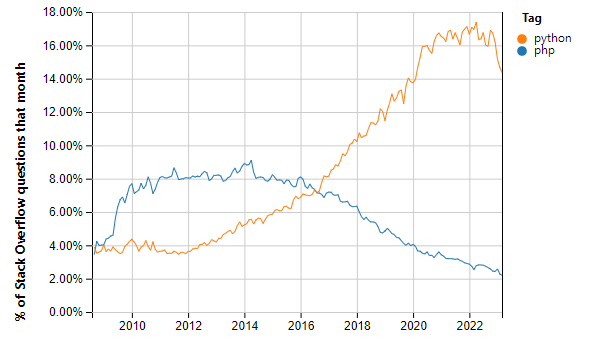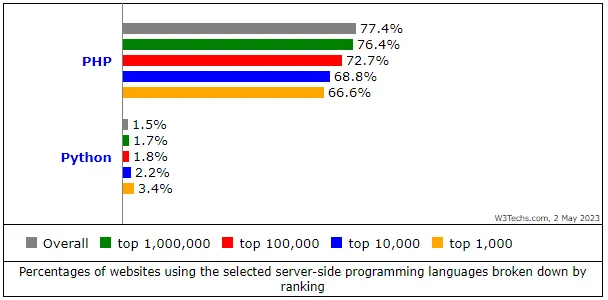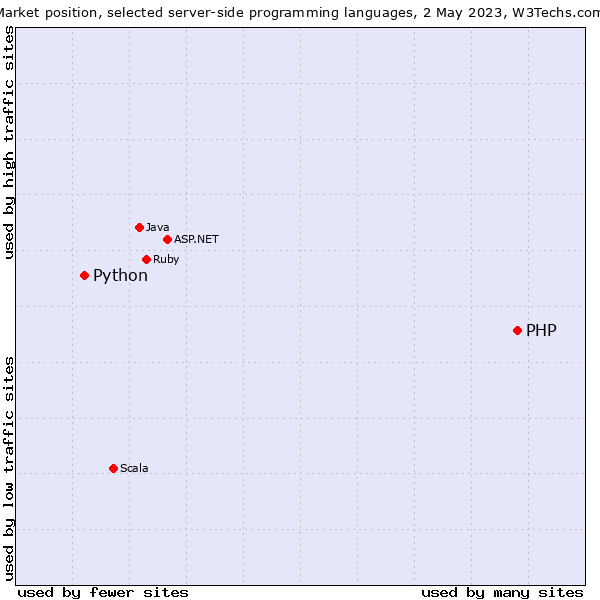Blog Overview
Both Python and PHP are prominent and powerful languages and among the two, Python is used for general purposes similar to Java and PHP which are mostly used for web development. They are quite different from one another in terms of defining variables, syntax, speed, areas of application, code readability, etc. Python came to the market earlier than PHP whereas PHP is a more popular language.
There is an interesting cold war occurring between PHP fans and Python lovers and it’s not showing any signs of dying down. It will be interesting to see how Python and PHP raise their game to win!
What is Python?
Python is a high-level programming language used for general purposes. Guido van Rossum, a Dutch programmer created Python in 1991 with a design philosophy of code readability with significant use of whitespace. It follows an object-oriented approach and allows programmers to write clean code. Often, Python is described as ‘batteries included’ for its standard exclusive libraries. It also supports procedural and functional programming paradigms. The garbage collection system in Python is quite straightforward with automatic memory management.
With a simple syntax and grammar, Python believes in a design philosophy called ‘there should be one—and preferably only one—obvious way to do it’ contrary to Pearls’ philosophy, ‘there is more than one way to do it’.
The latest version of Python is 3.10.11 which was released on April 5, 2023.
The core philosophy of Python as mentioned in the Zen of Python (document):
- Beautiful is better than ugly
- Explicit is better than implicit
- Simple is better than complex
- Complex is better than complicated
- Readability counts
Generic Features of Python
- Easy-to-learn syntax that makes it a popular choice for beginners and experienced developers.
- It can run on different hardware platforms with the same interface.
- You can add different low-level modules to the Python interpreter.
- Python features a suitable structure as well as support for large programs.
- Python has an automatic garbage collection.
- It has interactive modes for testing & debugging.
- It supports high-level dynamic data types and dynamic type checking.
- You can integrate Python with Java, C, and C++.
- Cross-platform compatibility (can run on different operating systems, such as Windows, Linux, and macOS)
What is PHP?
Like Python, PHP or Hypertext Preprocessor is also a generic purpose programming language. However, it was originally designed as a web development language. A Danish-Canadian programmer named Rasmus Lerdorf created PHP in 1994.
You can execute PHP with a Command Line Interface (CLI) which is embedded into HTML. In addition, you can go with a combination of various web template systems. Generally, a PHP interpreter deploys the code as a module on a web server. If we keep aside the web context, we can use PHP for robotic control drone and standalone graphical applications also.
The latest version of PHP is 8.2 and it was released on 24 Nov 2022.
Generic Features of PHP:
- Open-source programming language
- Cross-platform compatibility (works on various operating systems)
- Easy to learn and use
- Designed for web development
- Supports various web frameworks such as Laravel, Symfony, and CodeIgniter
- Supports a wide range of databases including MySQL, PostgreSQL, Oracle, and MongoDB
- Offers strong community support and a wealth of online resources
- Can be used for server-side scripting, command-line scripting, and desktop application development
- Supports various file formats such as XML, JSON, and CSV
- Offers powerful string manipulation and regular expression capabilities.
Python vs. PHP Comparison Table
Python vs. PHP is a never-ending battle and we can’t get rid of the fact that Python is cooler than PHP in several fields and vice versa! PHP relies on object-oriented programming, while Python encompasses both object-oriented and procedural programming paradigms. Python, being a versatile programming language, is widely employed in backend web development.
We are comparing both languages in the light of some pre-defined parameters in the following table:
|
Parameter |
Python |
PHP |
|
Frameworks |
Python has fewer frameworks |
PHP has more frameworks |
|
Popularity |
Broadly used in data science, AI and scientific community |
Main choice for web development |
|
Database Connectivity |
Narrow database connectivity support |
Supports more than 20 various databases |
|
Community Support |
Currently growing fast. |
Broader community support. |
|
Learning curve |
Python is perfect for long-term projects. |
PHP has a very low learning curve. |
|
Readability |
Python uses strict indentation enforcements that empower more readability. |
Being a highly documented language, PHP follows a classic approach |
|
Type of language |
General purpose programming language |
Web development programming language. |
|
Syntax |
Quite clear and concise. |
The built-in library has a large number of naming conventions |
|
A famous company using this technology |
Uber, Pinterest, Mozilla |
Hootsuite, Viber, Appcelerator |
|
Git hub stars |
30.4 K |
30 K |
|
Fork |
8.23 K |
8.04 K |
|
TIOBE rating |
4th position |
7th position |
|
Key Features |
Rapid development &Dynamic typing |
Open source, Easy Deployment, and, Continual Improvements. |
|
Best frameworks |
Flask, Django, jam.py. |
Slim, Laravel, Fast-free framework. |
|
Salaries |
The average amount: $120,024 per year |
The average amount: $86,017 per year. |
The Basic Coding Differences
Let’s see how both PHP and Python differ from each other in terms of their code functionalities:
|
Basic Coding Differences |
Python |
PHP |
|
Variables |
Defining variables in Python is a simple hack. If you want to define a variable and set value (1) for it, just mention in words (one).
|
You can define the variable as numbers in PHP. |
|
Control Flow |
‘If’ and ‘Else’ are used as expressions for true and false. |
Same as Python |
|
Looping / Iterator |
Python has various looping forms. ‘While’ is used for a true statement and ‘for’ is used for the false one, provided with a looping condition. |
PHP uses While, Do-While, For and Foreach Loops. |
Python vs. PHP Performance Comparison
A PHP vs. Python performance comparison will be an absolute idea to find out the strong competitor. Setting apart the technical parameters, we are using some general parameters to know which scores more in the Python vs. PHP war.
Ease of Learning
Python is one of the painless languages to learn. It has more code readability rather than other frameworks. In addition, with simpler syntax; Python is the king of big data now.
Unlike Python, PHP is not a general purpose language and it is solely built for web development.
Documentation
There is no clear winner between Python and PHP regarding document availability. Exclusive documents are available for learning both.
Community Support
Being a favored framework, PHP has strong community support. The popularity of this web development framework has generated a huge community for the same from where you can get immense support from all.
The most popular social network, Facebook runs on PHP. However, Python got its popularity when apps like YouTube, Instagram, Pinterest, and Reddit started using it.
Library Support
Python has excellent and well-developed library support and it beats PHP. When we talk about web development, PHP is like a dominating language. However, Python has some extraordinary machine learning libraries such as TensorFlow, Keras, Theano, Scikit Learn, etc. along with web development compatibility. In addition, the libraries of Python are easier to use, faster, and have better integration than other frameworks.
Speed
Speed is a critical factor to judge the performance of two frameworks.
Each time a file is created or modified; Python converts the code into bytecode. This code compilation method makes Python quicker than PHP. PHP programmers can simply improve the speed of PHP applications by installing a variety of caching systems. By default, as per Python developers, it is a faster language.
Learning Curve
Beginners find Python easy to understand and readable. Python has room for mistakes as the main code does not break due to small faults. This is one of the prominent reasons why the leading CS schools are adopting Python as a core language.
In addition, the PHP community is spending significant efforts to make the framework beginner friendly with all possible tutorials and courses.
Stack Overflow: Python vs. PHP tags
Stack Overflow is a popular developer’s platform where various development related questions are answered with the right solutions. Approximately more than 4 million developers use this platform every day. Therefore, it’s essential to compare the Python vs. PHP tags on this prominent platform.
Image courtesy: stackOverflow
Usage of PHP vs.Python for Web Development
It’s interesting to know the usage of PHP vs. Python for web development. The following diagram shows the percentage of how many websites use PHP and Python. Total 79.0% of all websites use PHP and in comparison to its overall 1.1% of websites using Python.
Image courtesy: w3techs.com
The Market position of Python & PHP
Below is a graph according to a survey completed by w3techs.com on 2nd May 2023, on the basis of traffic and popularity.
Image courtesy: w3techs.com
Summing Up
In terms of technical infrastructure Python always score high in the battle, Python vs. PHP, with impeccable code readability. When PHP is widely used for web development, Python is empowered with the magical power to define data science and machine learning apart from the capability of becoming a reliable web development platform. PHP is speedier than Python.
So choose wisely!






